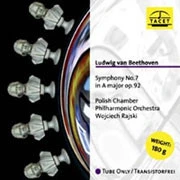180g Audiophile Vinyl Cut from the Original EMI Stereo Analogue Master Tapes at Abbey Road Studios!
Otto Klemperer (1885-1973) is remembered more as an old man whose last years embraced the refinement of analogue stereo recording and the burgeoning of color television (his performances of Beethoven Symphonies at the Royal Festival Hall were captured by the BBC). As a young man though, he was at the vanguard of much of the new music of the 20th century, and was friends with Mahler (assisting at the premiere of Mahler's 8th Symphony) and championed works by Janacek, Schoenberg, Stravinsky and Hindemith, as well as being a composer himself. Arguably his greatest legacy is the raft of superb recordings he made for EMI from 1954 until 1971, with his interpretations of Beethoven and Brahms symphonies particularly celebrated.
In the original 1972 review in the GRAMOPHONE they wrote:
"The main object of this new recording, I imagine, is to give us [Klemperer's] commanding version of this symphony in a really up to date recording and in this HMV's engineers have been highly successful. The remastered version of his older recording still sounds very well but one has only to compare a few bars to be convinced of the greater superiority of this new edition. It has a more immediate presence which increases the impact of this magisterial reading of the score, while the extremely well defined string bass draws attention to important points one might otherwise overlook; as for example, the place in the slow movement where the accompaniment to the main tune changes from quavers into triplets... As most readers will know by now, you must take Klemperer's Beethoven on his own terms: and his own terms are both impressive, and what is more important, often extraordinarily revealing."
Cut at Abbey Road Studios from the original stereo analogue master tapes with the Neumann VMS82 lathe fed an analogue pre-cut signal from a specially adapted Studer A80 tape deck with additional advance playback head, making the cut a totally analogue process.
Pressed on 180g vinyl to audiophile standards using the original EMI presses by The Vinyl Factory in Hayes, England.
Features:
Hi-Q Records Supercuts 180g Vinyl
Cut at Abbey Road Studios from the original EMI stereo analogue master tapes
Superior Audiophile Pressing
Features original album artwork
Made in England
Musicians:
New Philharmonia Orchestra
Otto Klemperer, conductor
Selections:
Ludwig van Beethoven (1770-1827)
Symphony No. 7
Side One:
1. 1st Movement: Poco sostenuto - Vivace
2. 2nd Movement: Allegretto
Side Two:
1. 3rd Movement: Presto - Assai meno presto
2. 4th Movement: Allegro con brio
Jean-Philippe Rameau (1683-1764) (Otto Klemperer arrangements)
Gavotte with Six variations
Recorded on 12 - 13 October 1968 at Number 1 Studio, Abbey Road, London
Otto Klemperer (1885-1973) is remembered more as an old man whose last years embraced the refinement of analogue stereo recording and the burgeoning of color television (his performances of Beethoven Symphonies at the Royal Festival Hall were captured by the BBC). As a young man though, he was at the vanguard of much of the new music of the 20th century, and was friends with Mahler (assisting at the premiere of Mahler's 8th Symphony) and championed works by Janacek, Schoenberg, Stravinsky and Hindemith, as well as being a composer himself. Arguably his greatest legacy is the raft of superb recordings he made for EMI from 1954 until 1971, with his interpretations of Beethoven and Brahms symphonies particularly celebrated.
In the original 1972 review in the GRAMOPHONE they wrote:
"The main object of this new recording, I imagine, is to give us [Klemperer's] commanding version of this symphony in a really up to date recording and in this HMV's engineers have been highly successful. The remastered version of his older recording still sounds very well but one has only to compare a few bars to be convinced of the greater superiority of this new edition. It has a more immediate presence which increases the impact of this magisterial reading of the score, while the extremely well defined string bass draws attention to important points one might otherwise overlook; as for example, the place in the slow movement where the accompaniment to the main tune changes from quavers into triplets... As most readers will know by now, you must take Klemperer's Beethoven on his own terms: and his own terms are both impressive, and what is more important, often extraordinarily revealing."
Cut at Abbey Road Studios from the original stereo analogue master tapes with the Neumann VMS82 lathe fed an analogue pre-cut signal from a specially adapted Studer A80 tape deck with additional advance playback head, making the cut a totally analogue process.
Pressed on 180g vinyl to audiophile standards using the original EMI presses by The Vinyl Factory in Hayes, England.
Features:
Hi-Q Records Supercuts 180g Vinyl
Cut at Abbey Road Studios from the original EMI stereo analogue master tapes
Superior Audiophile Pressing
Features original album artwork
Made in England
Musicians:
New Philharmonia Orchestra
Otto Klemperer, conductor
Selections:
Ludwig van Beethoven (1770-1827)
Symphony No. 7
Side One:
1. 1st Movement: Poco sostenuto - Vivace
2. 2nd Movement: Allegretto
Side Two:
1. 3rd Movement: Presto - Assai meno presto
2. 4th Movement: Allegro con brio
Jean-Philippe Rameau (1683-1764) (Otto Klemperer arrangements)
Gavotte with Six variations
Recorded on 12 - 13 October 1968 at Number 1 Studio, Abbey Road, London




 Turntable Accessories
Turntable Accessories Headphone Accessories
Headphone Accessories Cable Accessories
Cable Accessories Vinyl Accessories
Vinyl Accessories Compact Disc Accessories
Compact Disc Accessories







